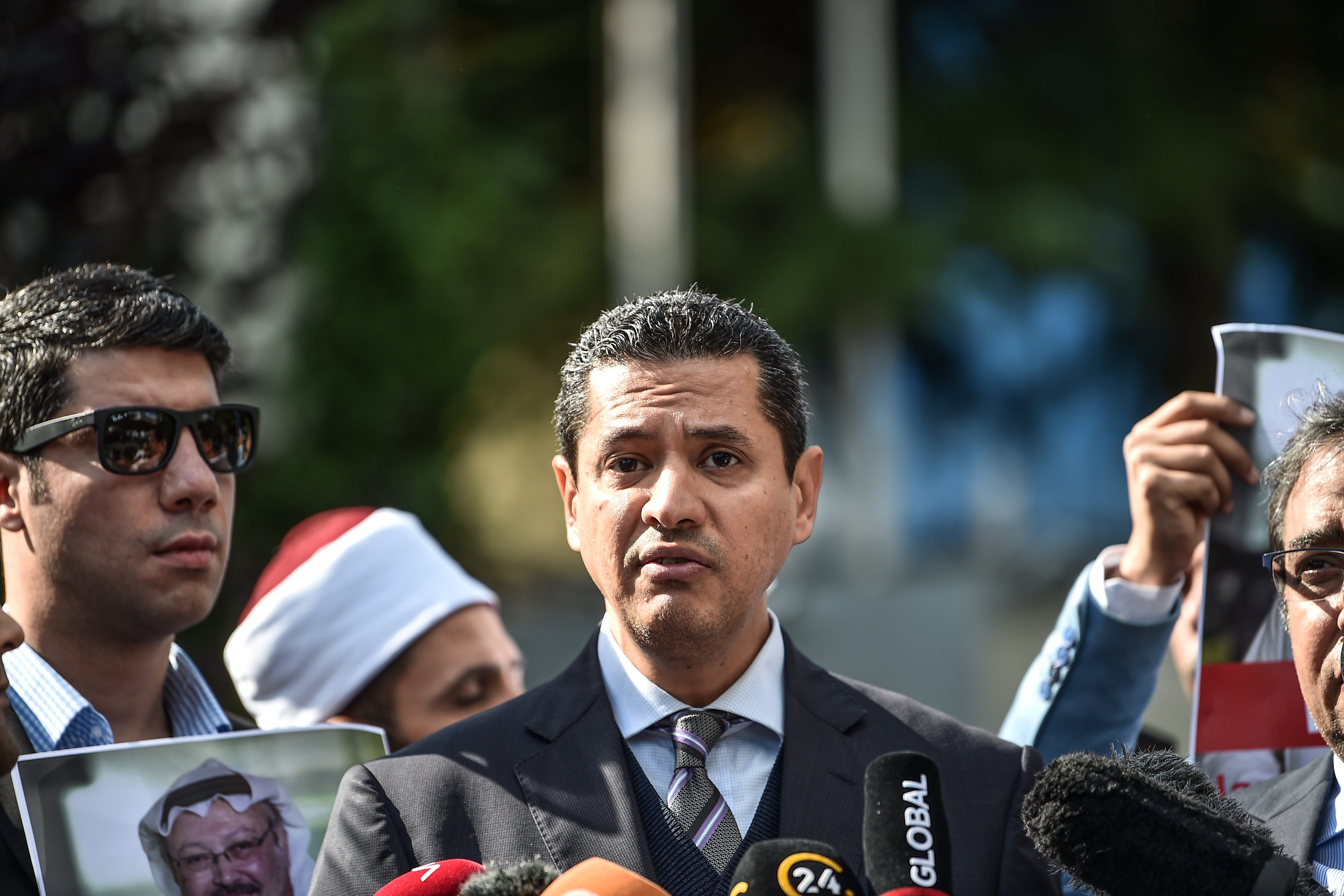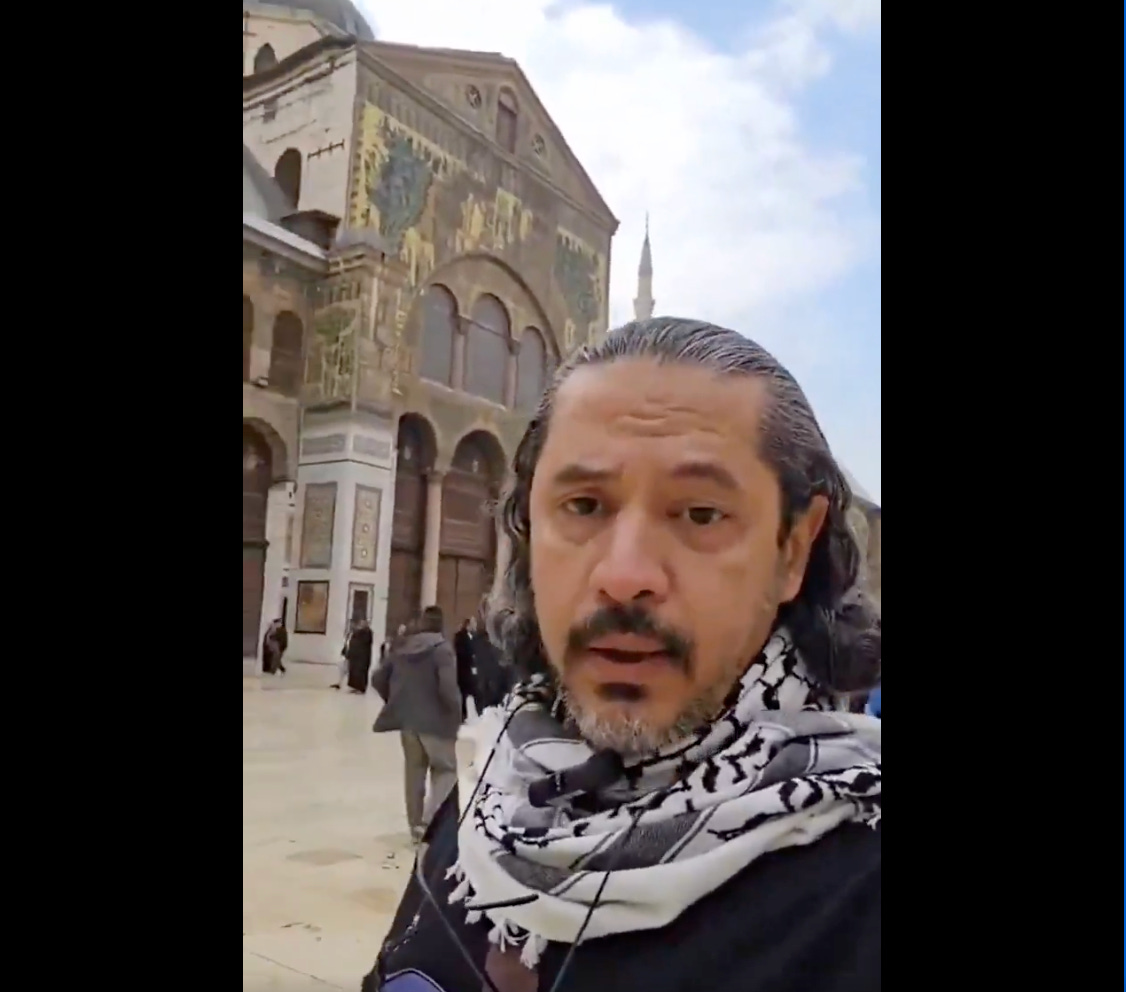Repression Without Borders: The Case of Abdulrahman Al-Qaradawi
Al-Qaradawi's extradition from Lebanon and imprisonment in the UAE is an alarming example of how Arab states collaborate to eliminate dissent beyond their borders.

CAIRO, EGYPT—In December, 2024, 54-year-old Egyptian-Turkish poet and political dissident Abdulrahman Yusuf Al-Qaradawi traveled to Syria to celebrate the collapse of the Assad regime at the hands of opposition fighters that month.
Standing outside the Umayyad mosque in Damascus wearing a Palestinian keffiyeh, Al-Qaradawi filmed a short video in which he said: “We pray that the Syrian people and their new leaders succeed in confronting all the evil challenges that the world is planning. At the forefront of the planners and conspirators are the shameful Arab regimes and the Arab Zionists—the UAE, Saudi Arabia, and Egypt. And we tell them: ‘You won’t be able to do anything in the face of the flood of change, which began on October 7, 2023 in Gaza.’” The clip was shared widely on social media.

A few days later, on December 28, he was detained by Lebanese security forces at the Masnaa border crossing as he was on his way to Beirut. At the behest of Emirati authorities, an extradition request had been issued by the Arab Interior Ministers Council (AIMC)—a regional security body sometimes referred to as “Arab Interpol.” Egyptian authorities also made a separate provisional arrest request.
Despite having no criminal record in the UAE and no legal ties to the country, on January 8, Al-Qaradwi was put on a private jet and extradited to Abu Dhabi.
Al-Qaradawi was able to conduct a one-minute phone call with his family in February and a heavily supervised ten-minute visit with family members at a private residence near Al-Razeen prison in Abu Dhabi in Ramadan on March 23. But since these momentary contacts with his family, he has effectively vanished. Al-Qaradawi has become subject to enforced disappearance.
Al-Qaradawi’s case has emerged as an alarming example of how Arab states are quietly collaborating to eliminate dissent beyond their borders, leveraging a little-known security pact to detain, extradite, and disappear critics under the guise of regional cooperation.
Legal experts believe that Al-Qaradawi’s case is not an outlier; it is both a dangerous precedent and a blueprint. “This is about making exile meaningless,” Mina Thabet, the head of the Middle East and North Africa at Pen International, told Drop Site. “It sends a message that the reach of repression knows no borders.”
A Tool for Repression
The son of the late influential Islamic scholar Yusuf Al-Qaradawi, and a prominent political activist during Egypt’s 2011 popular uprising, Abdulrahman Al-Qaradawi had lived in exile since 2014. Egyptian courts later sentenced him in absentia in separate court rulings to a total of eight years in prison on a range of charges, including opposing the state, inciting terrorism, spreading fake news and insulting the judiciary.
From abroad, he remained a vocal critic on social media—not only of the Egyptian government under President Abdel Fattah al-Sisi, but of the Gulf monarchies that helped prop him up.
“This was a textbook case of transnational repression,” said Tanya Boulakovski, lead legal advisor at MENA Rights Group, a Geneva-based legal advocacy NGO defending and promoting fundamental rights and freedoms in the MENA region.
“Abdulrahman was targeted for peaceful speech, forcibly disappeared, and transferred to a country where torture is systematic, all in violation of international law,” Boulakovski told Drop Site.
Boulakovski described the extradition as a clear breach of the non-refoulement principle a cornerstone of international law that prohibits transferring individuals to countries where they risk torture.
“Both Egypt and the UAE issued politically motivated warrants based solely on his [Abdulrahman’s] expression,” she said. “Extraditing someone in these conditions is a violation of international human rights law.”
In March 2025, Al-Qaradawi’s family appointed British barrister Rodney Dixon of Temple Garden Chambers in London and The Hague to lead an international legal campaign.
In a statement emailed to Drop Site, Dixon wrote that Abdulrahman was “forcibly removed across borders, and locked away in a country where he is not a citizen and there is no evidence he has committed any crime.”
“For over five months,” continued Dixon, “he’s been held in solitary confinement, with no charges brought against him and no recourse to any court. He is being kept in an undisclosed location, and we are increasingly concerned for his wellbeing.”
“It is unacceptable that this should happen in a country that claims to champion tolerance and coexistence, with an entire ministry dedicated to it,” said Dixon.
Executive director of the Egyptian Initiative for Personal Rights (EIPR), Hossam Bahgat, told Drop Site that “Abdulrahman was sentenced solely for his political beliefs—the very sentence that forced him into exile.” His arrest at Lebanon’s border with Syria and handover to Emirati authorities took place in a legal void, said Bahgat.
According to Boulakovski, the AIMC’s red notice system lacks even the minimal safeguards found in Interpol. “There’s no appeals process, no judicial oversight,” she said. “It operates as a rubber stamp for political persecution.”
Established in 1980, the AIMC “aims to enhance cooperation and coordinate efforts among Arab countries in the realms of internal security and crime prevention” with one of its express objectives being to develop “overarching policies to foster joint Arab action in internal security and endorsing joint Arab security plans to implement these policies.”
Politically Motivated Detention
Mohamed Sablouh, the human rights lawyer who represented Al-Qaradawi during his brief detention in Beirut, said the extradition defied both domestic and international law.
“We were never granted access to the arrest warrant. His lawyers filed urgent motions and appeals, but everything was ignored,” Sablouh told Drop Site. “Even after we warned authorities that he faced a serious risk of torture, they went ahead. It was clearly political.”
Sablouh is now pursuing legal action against Lebanese officials involved in the transfer, invoking universal jurisdiction statutes in Europe. “International law is very clear: Political dissidents cannot be returned to states where they risk persecution. This wasn’t a grey area; it was a red line.”
Since arriving in the UAE, Al-Qaradawi has been held incommunicado. Rights groups, including Human Rights Watch and Amnesty International, warn that his life and safety are at serious risk.
“We’ve documented prolonged solitary confinement, sensory torture, and other abuses inside UAE prisons,” Joey Shea, Gulf researcher at Human Rights Watch, told Drop Site. “There’s every reason to fear for Abdulrahman’s safety.”
According to Shea, the UAE’s image of multicultural tolerance belies one of the most abusive human rights records in the region. “Enforced disappearance, torture, mass trials without due process are regular tools of repression,” she said. “And they’re now being exported across borders.”
She pointed to the case of dual Emirati-Turkish citizen Khalaf al-Rumaithi, another dissident extradited under AIMC auspices, as part of a growing pattern. “Authoritarian regimes are leveraging regional alliances to disappear their critics. The Arab Interior Ministers Council is becoming a central tool in that machinery.”
The AIMC’s legal framework is alarmingly vague. According to Boulakovski, any kind of peaceful expression can be reclassified as a national security threat. “There’s no way for targeted individuals to know the charges against them, access their files, or appeal,” she said. “It strips away every basic legal safeguard.”
“The people we represent are left powerless,” Boulakovski said. “They’re simply disappeared into a regional black hole.”
A Case Built on Protected Speech
PEN International, a global writers’ association for promoting freedom of expression and advocating for imprisoned writers, has called for Al-Qaradawi’s release and said the case marks a dangerous escalation in the criminalization of speech.
“Abdulrahman wasn’t in the UAE. He wasn’t even a citizen. He was arrested for a video recorded in Syria, and extradited for criticizing a government that has no jurisdiction over him,” Thabet said. “That sets a terrifying precedent.” He sees the case as part of a broader shift in strategy by authoritarian governments: the externalization of repression.
“We’re no longer talking about controlling dissent at home. This is about projecting fear, making exile itself feel unsafe,” said Thabet.
While some cases have been successfully pushed back, as in the case of Sherif Osman, an Egyptian-American detained in Dubai but eventually released, or Abdel Basset Al Imam, an Egyptian dissident who narrowly avoided extradition from Morocco, Abdulrahman’s imprisonment stands out.
Testifying before the European Parliament earlier this month, Samar Elhussieny, executive director of the Egyptian Human Rights Forum, called Al-Qaradawi’s case “one of the most alarming” cases in recent years. “Translational repression is a threat to the international protection system itself, it weakens the asylum framework, it comprises the sovereignty of democratic states and it sends a chilling message to dissidents everywhere,” Elhussieny said.
Dixon explained that a formal complaint was filed in April with the UK’s Metropolitan Police, urging an investigation under universal jurisdiction.
“The complaint names multiple parties, including the UAE’s Ministry of Interior, former Lebanese Prime Minister Najib Mikati, and a private aviation company allegedly involved in Abdulrahman’s rendition,” Dixon said, adding that his law firm filed submissions with the UN special procedures, who have called for Al-Qaradawi to be allowed to return to Turkey, where he is a citizen.
Legal action like this, said Sablouh, helps build pressure even when direct access to the detainee is impossible: “It creates a record. It sends a signal. It makes this something governments can’t quietly bury.”
Yet, as Al-Qaradawi remains disappeared, there has been little outcry from the international community. Despite his Turkish citizenship, Ankara has issued no public statement. European governments and the UK have also avoided commenting.
“Western governments prioritize arms deals, trade, and counterterrorism partnerships over human rights,” said Shea. “That silence enables the abuse.”
Meanwhile, Al-Qaradawi’s family remains in the dark. “We have no information. No legal access. No consular support. Nothing,” a relative of Al-Qaradawi, who preferred to remain anonymous, told Drop Site.
As Boulakovski warned, unless the AIMC’s mechanisms are overhauled, dissidents across the Arab world must think twice before transiting through states that “seem” friendly.
“The infrastructure is now in place for authoritarian coordination, and that should alarm everyone,” said Boulakovski. “Silence doesn’t begin at the border, it follows you across it.”
This article is published in collaboration with Egab.
* NOTE: This article was updated to amend Mina Thabet’s position to “the head Middle East and North Africa at Pen International” from “PEN’s Director of Policy and Advocacy.”








Thanks for doing this reporting. Lets pray that he is freed ASAP.
Thank You.
May you celebrate/rest on Juneteeth, America's new holiday.